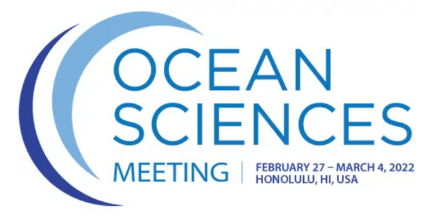CLIVAR town hall & sessions at 2022 Ocean Sciences Meeting

The Ocean Science Meeting sessions are listed in the following categories: US CLIVAR-sponsored; Air-Sea Interactions; Coastal and Biogeochemistry; Deep Sea Processes; High Latitude; Ocean Biology and Biogeochemistry; Climate and Ocean Change; Ocean Data Science, Analytics, and Management; Ocean Modeling and Observations; and Other. This list of sessions is not intended to be exhaustive but to help the community digest the collection of the hundreds of sessions and events. Deadline for abstract submissions is September 29, 2021.
If you have a relevant session that you want to be included in this list, please email Jennie.
US CLIVAR-sponsored sessions and town halls
Advances in Data Science for Ocean Uncertainty Quantification
The Arctic Ocean's changing Beaufort Gyre
US CLIVAR Town Hall on Climate at the Coasts (February 24 @ 12pm ET)
US CLIVAR and IARPC Town Hall: Changing Circulation of the Arctic Ocean and Sub-Arctic Seas (February 24 @ 1pm ET)
Air-Sea Interactions
Extratropical climate variability and change associated with air-sea interactions
Fluxes and Physical Processes Near the Air-Sea Interface: Observations and Modeling
Subtropical Air-Sea Interaction
The role of ocean-atmosphere dynamics in global climate
Tropical Cyclone-Ocean Interactions: From Weather to Climate
Coastal and Biogeochemistry
Acidification in the Gulf of Mexico – chemical changes, biological and ecological responses
Coastal Acidification in a Multistressor Ocean
Going to the extreme: Biogeochemical responses of coastal ecosystems to storms and fires
Oceanic interscale connectivity: larger-scale dynamics influencing coastal regions
Towards understanding coastal sea-level variability and change
Deep Sea Processes and Exploration
Advancing Ocean Exploration Technology
Discovering the Unknown Ocean: NOAA Ocean Exploration 2001 – 2021
High Latitude
Advances in understanding the circulation and carbon cycle of the Southern Ocean
Air-Ice-Ocean Interactions in a Changing Arctic
Arctic ocean gateways - changes, processes, and impacts
Arctic Ocean changes and processes
Autonomous Sensing and Monitoring in Polar Environnments
Coastal Circulations and Biogeochemical Processes in High Latitudes in a Changing Climate
From the Antarctic margin to the open ocean: discerning variability and change in the Southern Ocean
Floe-scale sea ice processes: constraints from observations and models
Ice-Ocean Interactions and Circulation around the Antarctic Margins
Integrate knowledge of Arctic and Antarctic Oceans
Mechanisms for Variability, Circulation, and Transformation of Water Masses in the Southern Ocean
Sea ice - ocean interactions at the meso- to submesoscales in polar regions
The Arctic Ocean Carbon Cycle: Past, present and future
The Arctic Ocean's changing Beaufort Gyre
Ocean Biology and Biogeochemistry
Convergent approaches to elucidating viral impacts on the oceanic carbon cycle
Quantifying the Ocean Carbon Sink
Research Opportunities from a Global Biogeochemical Argo Fleet
The evolving ocean carbon sink: what is the contribution of biological processes?
Climate and Ocean Change
Climate Change and Coastal Disasters: Application of Digital Technology to Mitigate Climate Impacts
Climate Impacts on Marine Fish, Fisheries, and Protected Species
ENSO dynamics and its impact on other basins based on theory, observation and modeling
High-Resolution Geochemical Proxies of Global Change: Progress, Problems, and Utility
Ocean Heat Transport Across Scales: Mechanisms and Impacts
Marine Climate Extremes: PART 1 Mechanisms, Predictability & Coastal Impacts
Marine Climate Extremes: PART 2 Regional Downscaling & Climate Projections
Marine Climate Extremes: PART 3 Biogeochemical Extremes and Ecosystems Response
Resilient fisheries in changing oceans
Science and Application of Equitable Solutions to Future Sea-Level Rise
Sea level in a warming world: global changes and large-scale processes
Seasonal-to-decadal forecasting of the marine environment
The Growing Need of Public-Private Partnerships in Advancing Climate-Ready Fisheries
Toward Predictive Understanding of Pacific Decadal Variability and its Global Implications
Vertical Transport: Connecting the Surface to the Deep
Ocean Data Science, Analytics, and Management
Advances in Data Science for Ocean Uncertainty Quantification
Advances in Machine Learning for Oceanographic Sensing Applications
Advances in the analysis and representation of spatio-temporal data
Analyzing Sea Ice with Machine Learning Techniques
Artificial Intelligence and Machine Learning in Ocean Data, Modeling and Applications
Artificial Intelligence in Ocean Modelling
Democratizing Data: Environmental Data Access and its Future
Digital Twins of the Ocean: From Pilot activities to applications
Uncertainty Quantification in Natural Hazards Associated with Coastal Processes
Ocean Modeling and Observations
Advances in Computational Oceanography
Advances in Ocean Data Assimilation, Forecasting, and Reanalysis
Biogeochemical-Physical Interactions in the Tropical Oceans
Inter-scale connections and transfers in mesoscale, submesoscale, and boundary layer turbulence
Linking the mesoscale circulation, geochemistry, and ecology of the Gulf of Mexico
Mesoscale Eddy Energy and Ocean Transport
New insights into submesoscale ocean biogeochemistry
Observing Air-Sea Interactions Strategy (OASIS) Ocean Shots for 2030
Observing and Predicting the Global Coastal Ocean
Ocean Salinity in Support of Scientific and Environmental Demands
Seasonal to Centennial Global Coupled Coastal Modeling
Studying the Ocean with Adjoint Models
The challenge of understanding rapidly changing small-scale ocean dynamics: preparation for SWOT
Understanding and Predicting the Gulf of Mexico Ocean Dynamics
Other
Adventures, Challenges, and Benefits of Conducting International Collaborative Research
Education, Outreach, and Citizen Science for Coastal Processes
Safety in Ocean Field Science: Prevention and Improved Response for Sexual and Gender Harassment
